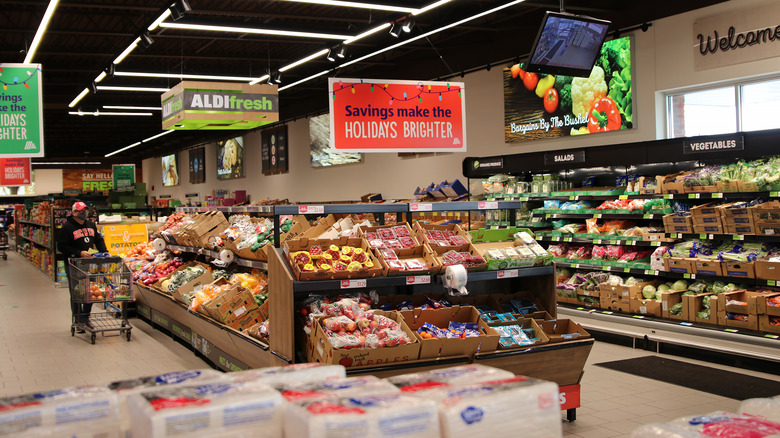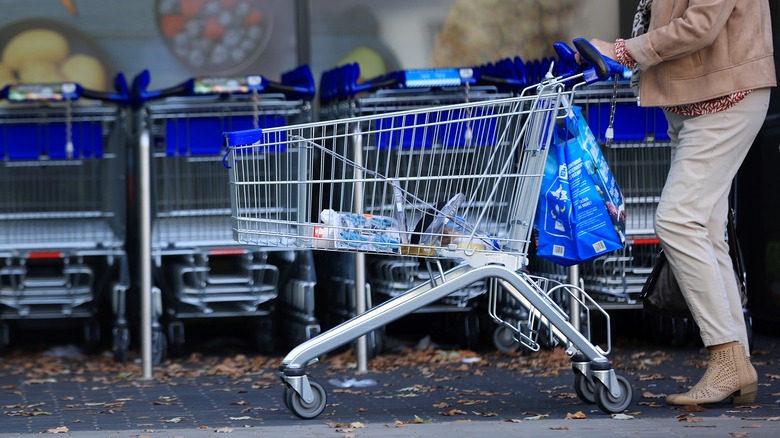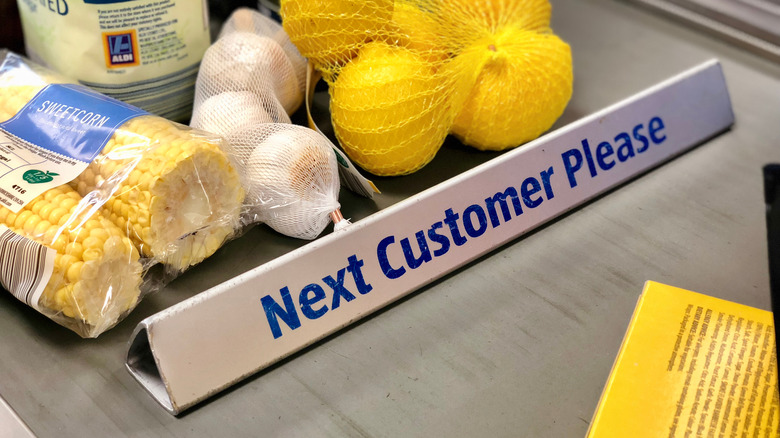Aldi Has Its Own 'Equator' Because Of A 1960s Controversy
There is a good chance you've probably shopped at an Aldi store at least once in your life. And if you are a fan of Trader Joe's, you might be surprised to learn that the company that is famous for its Joe's O's and Joe Joe's cookies has a surprising connection to the German-owned grocery store (via The Sun). However, it is not as straightforward as Aldi simply being Trader Joe's parent company, because Aldi itself isn't a single entity. In fact, you might be even more surprised to know that Aldi itself has been divided into two legally separate companies since the 1960s, according to The Guardian.
The now-famous global grocery chain actually had fairly humble beginnings. The first Aldi was opened in Essen, Germany in 1913 by a woman named Anna Albrecht. It operated as a little, unassuming corner shop until 1946, when her two sons, Theo and Karl, returned from fighting in World War II to take over the store. In just a few short years, the savvy brothers were able to successfully expand the shop, opening up 100 new locations across Germany by 1955, according to CNBC. Unfortunately, as is the case with many family-owned businesses, that was when the disagreements began.
The great Aldi divide started over cigarettes
Brothers Theo and Karl Albrecht operated their business with a keen eye towards thrift and efficiency, which enabled them to sell their goods at prices up to twenty percent less than their competitors, per CNBC. As the business grew, the brothers decided to shorten the name of their business venture to Aldi, a snappier version of the original "Albrecht Diskont" name. Things appeared to be going swimmingly until 1961, when a seemingly minor business disagreement created a rift between the company that continues to this day.
Theo thought it would be a good decision to start selling cigarettes in their grocery stores. However, the more cautious Karl was against the idea, believing that selling smokes would entice thieves to shoplift from their stores, according to The Guardian. The two brothers were unable to come up with a compromise, so they came up with a solution: split the entire company in two.
At that point, Aldi was already operating 300 stores throughout Germany. To keep things fair, Theo and Karl created an "Aldi Equator" to divide the locations up. Running the dividing line through their hometown of Essen, the brothers decided that Theo would run all of the Aldis north of their concocted equator, and Karl would be in charge of all the Aldis south of it. Aldi was thus split into Aldi Nord and Aldi Süd, two entirely separate companies, with different headquarters — Aldi Nord in Essen and Aldi Süd in Mülheim — operating under the same name, per Brilliant Maps.
Aldi Nord and Aldi Süd operate as two separate companies
After the institution of the Aldi Equator, the two Aldis never reunited. Although Aldi Nord and Aldi Süd share information and even the same suppliers, they do not share profits, and Aldi Nord and Aldi Süd remain entirely separate legal entities, per The Guardian. The divide has remained reinforced even as Aldi has continued to expand throughout the world — and today, the Aldi Equator splits the entire globe. In the United States, Aldi Nord operates 474 stores, while Aldi Süd runs 1,750 locations. Aldi Süd has a monopoly on stores in Australia, Ireland, and Italy, while Aldi Nord has control of Poland, France, and Spain, according to Brilliant Maps.
Complicating matters in this family business feud, in a sense, is how Trader Joe's fits into the mix, and whether it deals with one Aldi or the other. An Aldi spokesperson assured The Kitchn that "ALDI U.S. and Trader Joe's are independently operated companies with no joint ownership." One could say the companies are more like cousins. In 1979, Aldi Nord purchased the flourishing chain but decided to allow it to keep running as an independent operation. However, the relationship got even more complicated once Aldi Süd got into the mix. Aldi Süd is the parent company of Trader Joe's, but only in Europe. So if you happen to feel some eerie similarities between the two store's cheap prices and ample cheese aisle, it might simply not be a coincidence.


